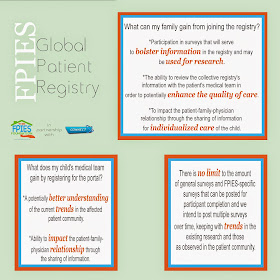The FPIES Global Patient Registry Getting to Know CONNECT
Part 3 of 3 in Registry Series
Patient
Crossroads' CONNECT program is, “a registry platform, which allows patients
around the world to join others in reporting their own experience of
disease.”-- From the Patient Crossroads Advocacy Brochure
According to the
Patient Crossroads website, “PatientCrossroads is a place where all kinds of people
can share and access medical data to hasten the search for cures. Our programs
enable anyone—from individual patients to global research organizations—to
collect and share disease data in a way that's controlled, transparent and
centered on patients' best interests. . .
The CONNECT registry enables disease communities, regardless of size and
shape, to collect and share de-identified patient data in a
consistent and transparent manner.”
For more, about de-identified data and
Patient Crossroads' strict confidentiality policies, read here:
https://www.patientcrossroads.com/advocacyfaq.html
What do I need to know about the latest updates to the Connect program?
Recently, participants received the ability to upload genetic
testing results and growth charts to the database. It is essential to
remember that if you elect to upload any information to the portal, you MUST
remove any identifying information from the documents, such as birth date,
medical record numbers, name, and so on. Printing out a copy of each
electronic document, blacklining identifying information and then re-scanning
to the computer for upload may be a potential way to approach this process.
Uploading information is optional and does not affect participation in the
surveys. For any questions about this process, please contact us at
contact@thefpiesfoundation.org. For more about additional updates from CONNECT,
please visit: https://www.patientcrossroads.com/
What other organizations utilize the registry process through patient crossroads CONNECT program?
◦
The Alzheimer's
Association
◦
The American
Cancer Society
◦
Parent
Project Muscular Dystrophy
◦
Government
Organizations: NIH Office
of Rare Diseases Research and RD-Connect (FP7 European Union Programme)
For more, read here:
https://www.patientcrossroads.com/advocacy-research-clients.html and here:
https://www.patientcrossroads.com/industry-government-clients.html
What will be coming up in the future?
◦
Over the next
year, regular survey releases will include FPIES-specific, IRB-backed and
“research-minded” surveys in combination with surveys targeting general health
topics. We will further develop a strong foundation of data, impact
existing and future research, and strengthen the collective voice of the FPIES
community.
◦
The ability to
become aware of clinical trials or other studies, posted in the
portal by researchers or other medical industry professionals
How can I register today?
1.
Go to the FPIES
Foundation's home page (www.fpiesfoundation.org) and click on the blue “Connect” logo on the left
side of the page
2.
You will arrive
at the home page for The FPIES Foundation Global Registry. Click the blue box
that says “Click to Register Now!”
3.
Complete the
“Consent and Registration” section. Click “Register” and you are ready to go!
4.
On your dashboard
page, you will be able to select surveys to complete at your convenience. View
the results as you complete each one and learn more about the FPIES community
as you CONNECT!! Be sure to register each member of your family diagnosed with
FPIES
5.
For PORTAL
Registration, simply go to the
patient crossroads homepage at www.patientcrossroads.com and click on the button that says “log in/sign up”
and follow the prompts!
6.
For additional
support, contact us at contact@thefpiesfoundation.org
Additional Resources:
- http://www.ncbi.nlm.nih.gov/books/NBK49448/
- www.patientcrossroads.com
- http://www.hopkinsmedicine.org/institutional_review_board/hipaa_research/de_identified_data.html
The FPIES Global Patient Registry
- This registry is operated on the Patient Crossroads CONNECT platform and adheres to the Patient Crossroads privacy policy and terms of use.
- For questions regarding the registry’s privacy policy, terms of use, and/or any other questions regarding the FPIES Global Patient Registry, please email us: contact@thefpiesfoundation.org.
This post was written by the Executive Board of The FPIES Foundation





.png)

